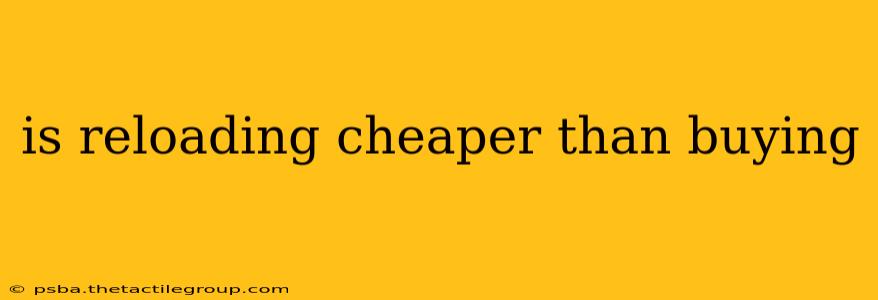The question on every shooter's mind: is reloading ammunition truly more economical than buying it pre-made? The answer, while seemingly straightforward, depends on several factors. This in-depth analysis will explore the costs involved, helping you determine if reloading is the right choice for your shooting needs.
The Upfront Investment: Getting Started with Reloading
Before diving into per-round costs, let's address the initial investment. Reloading requires specialized equipment, which can be a significant upfront expense. This includes:
- Reloading Press: Prices range from budget-friendly hand presses to more robust progressive presses, impacting both speed and cost.
- Dies: Specific dies are needed for each caliber, representing a cost per caliber you reload.
- Case Preparation Tools: These tools, including case trimmers, de-cappers, and potentially a tumbler, are essential for preparing spent cases for reloading.
- Powder Measure: Accuracy is crucial; a quality powder measure is vital for consistent and safe reloading.
- Scale: A precise scale is necessary to measure powder charges accurately. Safety is paramount, and an accurate scale is crucial.
- Primers: These ignite the powder, and their cost should be factored into your overall calculation.
- Bullets: The projectiles you'll use, requiring careful selection based on your needs and firearm.
- Miscellaneous Supplies: This includes lubricants, case cleaning solutions, and other small items.
The initial investment can range from a few hundred dollars for a basic setup to well over a thousand for a more advanced, efficient system. This upfront cost needs to be considered alongside long-term savings.
Ongoing Costs: The Per-Round Breakdown
Once you've made the initial investment, the ongoing costs involve the components needed to reload each round:
- Brass Cases: While you'll initially purchase cases, collecting and cleaning spent brass significantly reduces this cost over time.
- Gunpowder: This is a significant recurring cost. The price per pound varies depending on the powder type and current market conditions.
- Primers: The cost per primer is relatively low, but it adds up over many rounds.
- Bullets: Bullet costs vary drastically depending on the type, weight, and manufacturer.
Comparing Costs: Reloading vs. Buying Factory Ammo
The true cost savings of reloading become apparent over time and volume. While the initial investment is substantial, the cost per round for reloading is typically significantly lower than purchasing factory ammunition, especially for popular calibers. However, less common calibers may not offer the same cost advantage. To accurately compare costs, you'll need to calculate the cost per round for both methods using current prices from your local suppliers.
Factors Influencing Cost Comparisons:
- Volume: The more rounds you reload, the greater the cost savings.
- Caliber: Popular calibers generally offer better cost savings due to economies of scale for components.
- Component Prices: Market fluctuations in component prices directly impact the cost-effectiveness of reloading.
- Time and Labor: Reloading is time-consuming. Factor in your time value when assessing the overall cost savings.
Conclusion: Is Reloading Right For You?
Reloading can be a rewarding and cost-effective hobby, but it's not for everyone. Carefully weigh the upfront investment, ongoing costs, and your shooting volume before making a decision. If you shoot frequently and appreciate precision and control over your ammunition, the long-term savings and satisfaction of reloading might outweigh the initial hurdles. For occasional shooters, the upfront investment might not be justified. Thoroughly research and compare costs to make an informed decision that best suits your shooting needs and budget.

